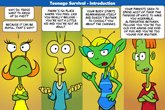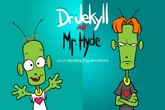Autism Representation Gets a Positive Boost with New Barbie Doll
In January of this year, the Mattel toy company introduced an autistic Barbie to its lineup of popular fashion dolls. The company partnered with the nonprofit disability rights organization Autistic Self Advocacy Network (ASAN), which works to empower the autistic community, to develop the doll. The process took over eighteen months to complete.
The autistic Barbie comes with a fidget spinner, noise-canceling headphones, and a computer tablet showing symbol-based augmentative and alternative communication apps. She joins Mattel’s other Barbie figures designed to champion diversity, including versions with Down syndrome, blindness, vitiligo, prosthetic limbs, and more.
The autistic Barbie comes with a fidget spinner, noise-canceling headphones, and a computer tablet showing symbol-based augmentative and alternative communication apps. She joins Mattel’s other Barbie figures designed to champion diversity, including versions with Down syndrome, blindness, vitiligo, prosthetic limbs, and more.
Categories: Teen Health
Canadian Olympian Shines in Figure Skating—and in Time Management
Balancing school and athletics can be stressful, especially when you have work due at the same time that you’re preparing for an important competetion. Multiply that feeling a dozen times over and you might understand how twenty-two-year-old Canadian figure skater Maddie Schizas felt when she realized she owed her McMaster University sociology professor a writing assignment—the day before she performed in the Winter Olympics’ women’s short program.
Fortunately, Maddie understands that openness and good communication are essential skills for time management. She sent her professor an email from Milan, Italy, explaining that she’d misread the assignment due date and requesting an extension. The teacher gave her extra time to finish the paper, and was impressed that Maddie didn’t try to use her position as leverage. “I respect the fact that she wasn’t using that as a reason to get special treatment or accommodations,” he said. He even posted a photo of himself watching her performance on Instagram. Maddie finished sixth in the program, helping Canada to finish fifth overall.
Fortunately, Maddie understands that openness and good communication are essential skills for time management. She sent her professor an email from Milan, Italy, explaining that she’d misread the assignment due date and requesting an extension. The teacher gave her extra time to finish the paper, and was impressed that Maddie didn’t try to use her position as leverage. “I respect the fact that she wasn’t using that as a reason to get special treatment or accommodations,” he said. He even posted a photo of himself watching her performance on Instagram. Maddie finished sixth in the program, helping Canada to finish fifth overall.
Categories: Teen Health
A New Study Reveals the Risks of Gambling for Adolescent Boys
A newly published study by Common Sense Media reveals the extent of gambling’s appeal to and risks for boys, especially online. The research, conducted in July 2025, surveyed 1,017 boys between the ages of eleven and seventeen across the United States, and found that 36 percent of them had gambled in 2024.
While 14 percent of the participants said they’d actively searched for betting opportunities on the Internet, over half of the gambling content they encountered was passive—it appeared in the broadcasts or live-streams of sporting events they watched, showed up in ads in the YouTube video accounts they follow, “just started showing up” in their social media feeds, or was shared with them by friends. Perhaps most surprisingly, nearly two-thirds of boys who gambled placed bets and used other gambling-like systems in the video games they played, making this the most widespread form of online gambling reported in the study.
While 14 percent of the participants said they’d actively searched for betting opportunities on the Internet, over half of the gambling content they encountered was passive—it appeared in the broadcasts or live-streams of sporting events they watched, showed up in ads in the YouTube video accounts they follow, “just started showing up” in their social media feeds, or was shared with them by friends. Perhaps most surprisingly, nearly two-thirds of boys who gambled placed bets and used other gambling-like systems in the video games they played, making this the most widespread form of online gambling reported in the study.
Categories: Teen Health
California Teen Creates a Prize-Winning Device to Monitor Falls
A thirteen-year-old in Hacienda Heights, California, has created a computer device that pairs with a mobile app to detect when someone has fallen. Kevin Tang was prompted to develop Fallguard when his own grandmother and a friend’s grandparent separately suffered debilitating falls that went undetected for long periods. Using Google’s MediaPipe artificial intelligence (AI) library, Kevin devised a way to connect a camera to the computer and mobile app, which can be installed on multiple phones without the need for cellular service or messaging fees.
Fallguard won Kevin first place at the 2025 3M Young Scientist Challenge last October, which came with an award of $25,000. He’s already reinvested part of his cash prize toward improving and growing the project. And while the money is nice, the effort that went into building Fallguard is what Kevin is most proud of. “I just kept working until I had a final product,” he said.
Fallguard won Kevin first place at the 2025 3M Young Scientist Challenge last October, which came with an award of $25,000. He’s already reinvested part of his cash prize toward improving and growing the project. And while the money is nice, the effort that went into building Fallguard is what Kevin is most proud of. “I just kept working until I had a final product,” he said.
Categories: Teen Health
Self-Checkout Theft Is Rising, and Higher Prices Are the Cause
A survey from online loan service LendingTree released in December revealed an alarming trend: Among the more than 2,000 people who responded, 27 percent said that they’d deliberately not scanned items at retail self-checkout stations. This is up from 15 percent just two years ago. The main reason for the theft they reported was that essential items have become unaffordable (47 percent) and that prices have increased too much due to recent tariffs (46 percent). Over half of those who admitted to self-checkout theft said they’d probably do it again.
These motivations support recent data from the Consumer Food Insights Report (CFI), which found that the household food insecurity rate rose from 13.3 percent in October to 16 percent in November, the largest increase in all of 2025. (Food insecurity is when people don’t have enough to eat and aren’t sure where their next meal is coming from.) But while it’s tempting to think of shoplifting as a victimless crime, especially in tough economic times, retailers estimate that they’ll lose over $47 billion to shoplifting in 2025 alone.
These motivations support recent data from the Consumer Food Insights Report (CFI), which found that the household food insecurity rate rose from 13.3 percent in October to 16 percent in November, the largest increase in all of 2025. (Food insecurity is when people don’t have enough to eat and aren’t sure where their next meal is coming from.) But while it’s tempting to think of shoplifting as a victimless crime, especially in tough economic times, retailers estimate that they’ll lose over $47 billion to shoplifting in 2025 alone.
Categories: Teen Health
Independence Comes with Big Adjustments for College-Bound Teens
Looking forward to being on your own when you start college? Independence is one of the biggest draws of life after high school, as a recent survey conducted by media website SheKnows reveals: 95 percent of its Teen Council members said they were most looking forward to “freedom” when envisioning life on campus.
But with independence comes skills and responsibilities you’ll be encountering for the first time, and unlike at home and in school your schedule won’t be set by your parents, teachers, and coaches. This can be a shock, not least because you’ll go from 40 hours a week in the classroom to fewer than 20. Experts say the shock is normal, though, and establishing a routine will make the adjustment easier. It may take some time, but as University of Cincinnati first-year student Emily Gehrke points out, “Consistency is key—when challenges arise, your established routines will provide a stable foundation to fall back on.”
But with independence comes skills and responsibilities you’ll be encountering for the first time, and unlike at home and in school your schedule won’t be set by your parents, teachers, and coaches. This can be a shock, not least because you’ll go from 40 hours a week in the classroom to fewer than 20. Experts say the shock is normal, though, and establishing a routine will make the adjustment easier. It may take some time, but as University of Cincinnati first-year student Emily Gehrke points out, “Consistency is key—when challenges arise, your established routines will provide a stable foundation to fall back on.”
Categories: Teen Health
Weight-Loss Drug Results May Not Last After Quitting, New Research Shows
GLP-1 drugs like Zepbound and Wegovy work wonders for people who want to lose wieght, as well as for helping to reduce national obesity rates overall. But recent research has shown that quitting the drugs might not be a smooth process.
Results from a clinical trial published last month in JAMA Internal Medicine revealed that the majority of participants who were assigned to stop taking Zepbound regained most of the weight they’d lost while using the drug. The cardiovascular and metabolic improvements they experienced, such as lower blood pressure and cholesterol levels, diminished as well. As a result, two medical specialists from the University of Pittsburgh recommend that the branding of GLP-1 drugs be changed from “weight loss” to “weight management,” and that the people they are prescribed to should be advised that they may need to take them indefinitely to see continued results.
Results from a clinical trial published last month in JAMA Internal Medicine revealed that the majority of participants who were assigned to stop taking Zepbound regained most of the weight they’d lost while using the drug. The cardiovascular and metabolic improvements they experienced, such as lower blood pressure and cholesterol levels, diminished as well. As a result, two medical specialists from the University of Pittsburgh recommend that the branding of GLP-1 drugs be changed from “weight loss” to “weight management,” and that the people they are prescribed to should be advised that they may need to take them indefinitely to see continued results.
Categories: Teen Health
Research Shows How Having a Dog Can Boost Teens’ Mental Health
If you have a dog you probably already know the beneficial effects their playfulness, companionship, and devotion can have on your mood and emotions. Science backs this up, too. According to recent research, teens who live with dogs have notably lower occurrences of social withdrawal, disordered thinking, and aggressive behavior than those who don’t keep dogs.
Now, scientists have discovered another potential reason the family pooch makes you feel happier and more grounded: The microbes you share with them. Researchers in Japan have discovered that dog-owning teenagers had more types of certain bacteria in their saliva than was found in the saliva of non-dog owners. When transplanted into mice, the bacteria changed some of the rodents’ social behavior, including increasing instances of what’s known as “preconcern” or “empathetic concern,” a type of sympathetic response in animals and humans. How this microbe exchange works and specifically influences mood are still being investigated, and no amount of gut microbiome changes will convince people who don’t care for dogs to feel otherwise. But as one of the scientists observed, “Even without owning a dog, maintaining a diverse microbiome can potentially improve mental health scores.”
Now, scientists have discovered another potential reason the family pooch makes you feel happier and more grounded: The microbes you share with them. Researchers in Japan have discovered that dog-owning teenagers had more types of certain bacteria in their saliva than was found in the saliva of non-dog owners. When transplanted into mice, the bacteria changed some of the rodents’ social behavior, including increasing instances of what’s known as “preconcern” or “empathetic concern,” a type of sympathetic response in animals and humans. How this microbe exchange works and specifically influences mood are still being investigated, and no amount of gut microbiome changes will convince people who don’t care for dogs to feel otherwise. But as one of the scientists observed, “Even without owning a dog, maintaining a diverse microbiome can potentially improve mental health scores.”
Categories: Teen Health
Health Problems Plague Kids Who Have a Smartphone Too Young
A study published this month in the journal Pediatrics found that kids who have a smartphone by the age of 12 have a higher risk of poor sleep, depression, and obesity compared to their peers who don’t have the device. In fact, the earlier in life a child gets a smartphone, the more likely they are to develop these health issues.
The research, conducted by doctors at Children’s Hospital Philadelphia, the University of California at Berkeley, and Columbia University, gathered data from over 10,000 adolescents across the U.S. for two years. Their findings were eye-opening: Among the participants, over 63 percent owned a smartphone, and most of those kids had received the phone by the time they were 11. A year after the study was complete, the kids without smartphones had generally better mental health than those with them. Smartphones have legitimate uses, of course, and can play a key role in education and making social connections. But as child psychiatrist Dr. Ran Barzilay, the study’s lead author, notes, the decision to give a child younger then 12 a smartphone is a major one that should be made with care and deliberation. “Most probably, all teens will eventually have a smartphone,” he said. “Once this happens, it is advisable to monitor what our children do on their phones.” “Eventually” might come sooner than Dr. Barzilay knows—according to the Pew Research Center, 95 percent of teens between the ages of 13 and 17 owned a smartphone in 2024.
The research, conducted by doctors at Children’s Hospital Philadelphia, the University of California at Berkeley, and Columbia University, gathered data from over 10,000 adolescents across the U.S. for two years. Their findings were eye-opening: Among the participants, over 63 percent owned a smartphone, and most of those kids had received the phone by the time they were 11. A year after the study was complete, the kids without smartphones had generally better mental health than those with them. Smartphones have legitimate uses, of course, and can play a key role in education and making social connections. But as child psychiatrist Dr. Ran Barzilay, the study’s lead author, notes, the decision to give a child younger then 12 a smartphone is a major one that should be made with care and deliberation. “Most probably, all teens will eventually have a smartphone,” he said. “Once this happens, it is advisable to monitor what our children do on their phones.” “Eventually” might come sooner than Dr. Barzilay knows—according to the Pew Research Center, 95 percent of teens between the ages of 13 and 17 owned a smartphone in 2024.
Categories: Teen Health
Georgia High Schoolers Invent a New Way to Diagnose Lyme Disease
A group of high school students in Atlanta, Georgia, has created a new way to detect and potentially treat Lyme disease. Their discovery, which uses CRISPR-based gene-editing technology, is faster and more accurate than current methods of diagnosis, which often miss the disease in its earliest stage when it’s easiest to treat. Their project also uses CRISPR as a potential means of treating the disease through the bacteria that cause it. The students unveiled their invention at the International Genetically Engineered Machine (iGEM) competition in France this October, where they finished in the top ten for high school students.
Lyme disease can infect humans and other animals through the bites of ticks that carry the bacterium Borrelia burgdorferi. Symptoms inlclude arthritis, swollen joints, fever, and an initial rash. If left untreated the disease can become chronic, leading to potential organ damage. Lyme disease infects almost half a million Americans every year, primarily in the Northeast and Midwest.
Lyme disease can infect humans and other animals through the bites of ticks that carry the bacterium Borrelia burgdorferi. Symptoms inlclude arthritis, swollen joints, fever, and an initial rash. If left untreated the disease can become chronic, leading to potential organ damage. Lyme disease infects almost half a million Americans every year, primarily in the Northeast and Midwest.
Categories: Teen Health
Texas Teens Invent Device to Filter Microplastics from Water Supply
Microplastics, or tiny fragments of plastic worn away from the products we use and discard every day, are a common environmental problem. They’ve been found in the deepest oceans and on the highest mountain peaks, and in our bodies, too—researchers in Australia estimate that the average person swallows and breathes in a credit card’s worth of plastic every week. The health hazards of microplastics aren’t conclusive, but they’ve been linked to cancer, dementia, and reproductive disorders. And while there are ways to remove microplastics from the environment, these are generally expensive and can result in other types of pollutants.
Now, inspired by a visit to a water treatment plant and the realization that the U.S. Environmental Protection Agencey (EPA) doesn’t regulate microplastics, 17-year-olds Victoria Ou and Justin Huang of Woodlands, Texas, have invented an inexpensive, clean device that extracts microplastics from water. The process, which uses ultrasonic sound waves, is still being developed, but the pair are working to make it remove plastics from drinking water and industrial and residential wastewater. To help them continue their research, Ou and Huang won the Gordon E. Moore Award for Positive Outcomes for Future Generations, with a prize of $50,000.
Now, inspired by a visit to a water treatment plant and the realization that the U.S. Environmental Protection Agencey (EPA) doesn’t regulate microplastics, 17-year-olds Victoria Ou and Justin Huang of Woodlands, Texas, have invented an inexpensive, clean device that extracts microplastics from water. The process, which uses ultrasonic sound waves, is still being developed, but the pair are working to make it remove plastics from drinking water and industrial and residential wastewater. To help them continue their research, Ou and Huang won the Gordon E. Moore Award for Positive Outcomes for Future Generations, with a prize of $50,000.
Categories: Teen Health
California Law Lowers the Volume on Streaming Service Ads
A law signed by California Governor Gavin Newsom in October aims to put a stop to excessively loud advertisements on streaming services like Hulu, Netflix, and Amazon Prime in the state. The law is a response to these platforms airing commercials at a louder volume than the shows and movies during which they play, as well as a corresponding “troubling jump” in ad noise complaints received by the Federal Communications Commission (FCC). The streaming services are required to implement the ad volume limits by July 2026.
Data from the U.S. Centers for Disease Control and Prevention (CDC) estimates that 12.5 percent of U.S. children and teens have been diagnosed with some form of noise-related hearing loss. But how loud is too loud? According to the World Health Organization (WHO), the loudest you should ever play a personal audio device is 75 decibels, or no more than 60 percent of its maximum volume.
Data from the U.S. Centers for Disease Control and Prevention (CDC) estimates that 12.5 percent of U.S. children and teens have been diagnosed with some form of noise-related hearing loss. But how loud is too loud? According to the World Health Organization (WHO), the loudest you should ever play a personal audio device is 75 decibels, or no more than 60 percent of its maximum volume.
Categories: Teen Health
Nearly 50 Years of the Great American Smokeout
November is lung cancer awareness month, and this year it coincides with almost fifty years of the American Cancer Society’s Great American Smokeout. First held in California on November 18, 1976, the initial Great American Smokeout helped nearly a million people quit smoking for the day. It continues to encourage people to stop smoking nearly a half-century later, emphasizing the resources available to help them quit for good.
According to the U.S. Centers for Disease Control and Prevention (CDC), cigarette smoking among U.S. adults has dropped by almost two-thirds in that time, and among current smokers nearly 70 percent want to quit and about half have made an effort to do so in the past year. This is good news, but almost 35 million American adults still smoke, and lung cancer remains the leading cause of cancer deaths in the United States and Canada. Even more alarming, research shows an increase in lung cancer diagnoses among people under age fifty, especially those who have never smoked. There could hardly be a better reminder that, if you smoke or know someone who does, it’s never too early to stop.
According to the U.S. Centers for Disease Control and Prevention (CDC), cigarette smoking among U.S. adults has dropped by almost two-thirds in that time, and among current smokers nearly 70 percent want to quit and about half have made an effort to do so in the past year. This is good news, but almost 35 million American adults still smoke, and lung cancer remains the leading cause of cancer deaths in the United States and Canada. Even more alarming, research shows an increase in lung cancer diagnoses among people under age fifty, especially those who have never smoked. There could hardly be a better reminder that, if you smoke or know someone who does, it’s never too early to stop.
Categories: Teen Health
Georgia Teen Helps Fill the Gap Left by Lapse in SNAP Benefits
A teen in Gwinnett County, Georgia, has stepped up to help the people in his community who are impacted by the suspension of Supplemental Nutrition Assistance Program (SNAP) benefits caused by the ongoing government shutdown. Sixteen-year-old Jaeleon Hawkins-Jones of Snellville started a GoFundMe campaign in partnership with the Southeast Gwinnett Co-op Ministry to provide food boxes with rice, pasta, canned goods, cereal, peanut butter, and other essentials to affected residents. Jaeleon’s initial goal of $1,000 was quickly met and exceeded, so he plans to include gift cards recipients can use to put gas in their cars along with the food.
About 1.4 million people throughout Georgia receive SNAP benefits, and rely on the program to help them get enough to eat every month. As Jaeleon puts it, “When leadership fails to act, regular people like us have to step up.” Can you think of ways you could help your neighbors in need?
About 1.4 million people throughout Georgia receive SNAP benefits, and rely on the program to help them get enough to eat every month. As Jaeleon puts it, “When leadership fails to act, regular people like us have to step up.” Can you think of ways you could help your neighbors in need?
Categories: Teen Health
Creating Deepfakes with AI Text-to-Video Apps Isn’t Worth the Risk
When generative artificial intelligence (AI) company OpenAI released its text-to-video app Sora 2 in September of this year, it promised that “you are in control of your likeness end-to-end” in its cameos—short clips featuring users’ likenesses made from facial scans. However, a company called Reality Defender that detects deepfakes claims it was able to bypass Sora’s security safeguards within 24 hours of release, creating cameos of celebrities and CEOs using publicly available footage from the Internet.
This is a reminder not just to be careful before you post photos and videos of yourself, your family, and friends online, but also that creating AI content comes with a heavy responsibility. You should always consider the potential impact of any AI-generated images and videos you make available, and ensure that your work respects the rights and dignity of others. Failure to do so can spread misinformation, damage reputations, harm individuals’ privacy, and erode the trust you’ve built online.
This is a reminder not just to be careful before you post photos and videos of yourself, your family, and friends online, but also that creating AI content comes with a heavy responsibility. You should always consider the potential impact of any AI-generated images and videos you make available, and ensure that your work respects the rights and dignity of others. Failure to do so can spread misinformation, damage reputations, harm individuals’ privacy, and erode the trust you’ve built online.
Categories: Teen Health






